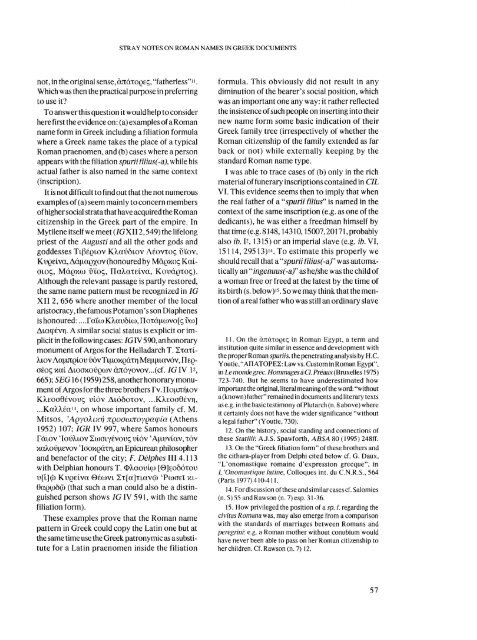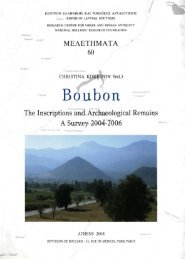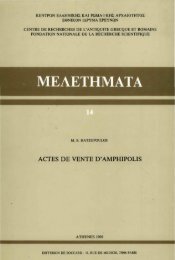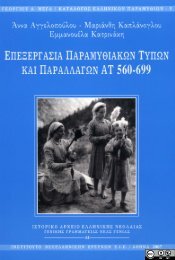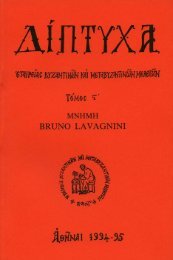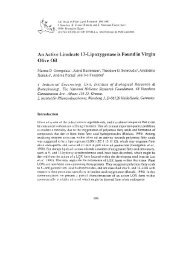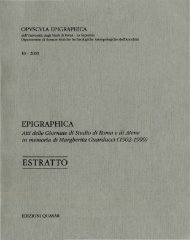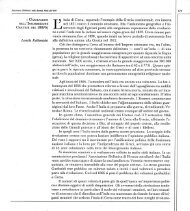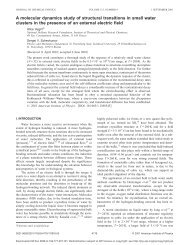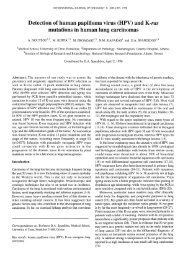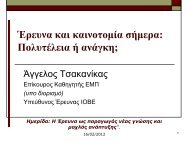Roman onomastics in the Greek East: social and political aspects ...
Roman onomastics in the Greek East: social and political aspects ...
Roman onomastics in the Greek East: social and political aspects ...
You also want an ePaper? Increase the reach of your titles
YUMPU automatically turns print PDFs into web optimized ePapers that Google loves.
STRAY NOTES ON ROMAN NAMES IN GREEK DOCUMENTS<br />
not, <strong>in</strong> <strong>the</strong> orig<strong>in</strong>al sense, άπάτορες, "fa<strong>the</strong>rless" 1 '.<br />
Which was <strong>the</strong>n <strong>the</strong> practical purpose <strong>in</strong> preferr<strong>in</strong>g<br />
to use it?<br />
To answer this question it would help to consider<br />
here first <strong>the</strong> evidence on : (a) examples of a <strong>Roman</strong><br />
name form <strong>in</strong> <strong>Greek</strong> <strong>in</strong>clud<strong>in</strong>g a filiation formula<br />
where a <strong>Greek</strong> name takes <strong>the</strong> place of a typical<br />
<strong>Roman</strong> praenomen, <strong>and</strong> (b) cases where a person<br />
appears with <strong>the</strong> filiation spurii filius(-a), while his<br />
actual fa<strong>the</strong>r is also named <strong>in</strong> <strong>the</strong> same context<br />
(<strong>in</strong>scription).<br />
It is not difficult to f<strong>in</strong>d out that <strong>the</strong> not numerous<br />
examples of (a) seem ma<strong>in</strong>ly to concern members<br />
of higher <strong>social</strong> strata that have acquired <strong>the</strong> <strong>Roman</strong><br />
citizenship <strong>in</strong> <strong>the</strong> <strong>Greek</strong> part of <strong>the</strong> empire. In<br />
Mytilene itself we meet ( JGXII2,549) <strong>the</strong> lifelong<br />
priest of <strong>the</strong> Augusti <strong>and</strong> all <strong>the</strong> o<strong>the</strong>r gods <strong>and</strong><br />
goddesses Τιβέριον Κλαύδιον Λέοντος ΰ'ιον,<br />
Κυρείνα, Δάμαρχον (honouredby Μάρκος Καίσιος,<br />
Μάρκω ΰϊος, Παλατείνα, Κουάρτος).<br />
Although <strong>the</strong> relevant passage is partly restored,<br />
<strong>the</strong> same name pattern must be recognized <strong>in</strong> IG<br />
XII 2, 656 where ano<strong>the</strong>r member of <strong>the</strong> local<br />
aristocracy, <strong>the</strong> famous Potamon 's son Diaphenes<br />
is honoured: ....Γαΐω Κλαυδίω, Ποτάμωνο[ς ΰω]<br />
Διαφένη. A similar <strong>social</strong> status is explicit or implicit<br />
<strong>in</strong> <strong>the</strong> follow<strong>in</strong>g cases: IGIV 590, an honorary<br />
monument of Argos for <strong>the</strong> Helladarch Τ. ΣτατίλιονΛαμπρίου<br />
ύονΤιμοκράτη Μεμμιανόν, Περσέος<br />
και Διοσκούρων απόγονο ν... (cf. IG IV Ι 2 ,<br />
665); SEG 16(1959) 258, ano<strong>the</strong>r honorary monument<br />
of Argos for <strong>the</strong> three bro<strong>the</strong>rs Γν. Πομπήιον<br />
Κλεοσθένους υίον Διόδοτον, ...Κλεοσθένη,<br />
...Καλλέα 13 , on whose important family cf. M.<br />
Mitsos, 'Αργολική προσωπογραφία (A<strong>the</strong>ns<br />
1952) 107; IGR IV 997, where Samos honours<br />
Γάιον Ίούλιον Σωσιγένους υίον Άμυνίαν, τον<br />
καλουμενον Ισοκράτη, an Epicurean philosopher<br />
<strong>and</strong> benefactor of <strong>the</strong> city; F. Delphes III 4.113<br />
with Delphian honours Τ. Φλαουίω [Θ]εοδότου<br />
υ[ί]φ Κυρείνα Θέωνι Στ[α]τιανω 'ΡωσεΙ κιθαρωδό)<br />
(that such a man could also be a dist<strong>in</strong>guished<br />
person shows IG IV 591, with <strong>the</strong> same<br />
filiation form).<br />
These examples prove that <strong>the</strong> <strong>Roman</strong> name<br />
pattern <strong>in</strong> <strong>Greek</strong> could copy <strong>the</strong> Lat<strong>in</strong> one but at<br />
<strong>the</strong> same time use <strong>the</strong> <strong>Greek</strong> patronymic as a substi <br />
tute for a Lat<strong>in</strong> praenomen <strong>in</strong>side <strong>the</strong> filiation<br />
formula. This obviously did not result <strong>in</strong> any<br />
dim<strong>in</strong>ution of <strong>the</strong> bearer's <strong>social</strong> position, which<br />
was an important one any way: it ra<strong>the</strong>r reflected<br />
<strong>the</strong> <strong>in</strong>sistence of such people on <strong>in</strong>sert<strong>in</strong>g <strong>in</strong>to <strong>the</strong>ir<br />
new name form some basic <strong>in</strong>dication of <strong>the</strong>ir<br />
<strong>Greek</strong> family tree (irrespectively of whe<strong>the</strong>r <strong>the</strong><br />
<strong>Roman</strong> citizenship of <strong>the</strong> family extended as far<br />
back or not) while externally keep<strong>in</strong>g by <strong>the</strong><br />
st<strong>and</strong>ard <strong>Roman</strong> name type.<br />
I was able to trace cases of (b) only <strong>in</strong> <strong>the</strong> rich<br />
material of funerary <strong>in</strong>scriptions conta<strong>in</strong>ed<strong>in</strong> CIL<br />
VI. This evidence seems <strong>the</strong>n to imply that when<br />
<strong>the</strong> real fa<strong>the</strong>r of a "spurii filius" is named <strong>in</strong> <strong>the</strong><br />
context of <strong>the</strong> same <strong>in</strong>scription (e.g. as one of <strong>the</strong><br />
dedicants), he was ei<strong>the</strong>r a freedman himself by<br />
thattime(e.g.8148,14310,15007,20171, probably<br />
also ib. I 2 ,1315) or an imperial slave (e.g. ib. VI,<br />
15114, 29513) 14 . To estimate this properly we<br />
should recall that a "spurii filius(-a)" was automatically<br />
an "<strong>in</strong>genuus(-a)" as he/she was <strong>the</strong> child of<br />
a woman free or freed at <strong>the</strong> latest by <strong>the</strong> time of<br />
its birth (s. below) 15 . So we may th<strong>in</strong>k that <strong>the</strong> mention<br />
of a real fa<strong>the</strong>r who was still an ord<strong>in</strong>ary slave<br />
11. On <strong>the</strong> απάτορες <strong>in</strong> <strong>Roman</strong> Egypt, a term <strong>and</strong><br />
<strong>in</strong>stitution quite similar <strong>in</strong> essence <strong>and</strong> development with<br />
<strong>the</strong> proper <strong>Roman</strong> spuriis. <strong>the</strong> penetrat<strong>in</strong>g analysis by H.C.<br />
Youtie, "ΑΠΑΤΟΡΕΣ: Law vs. Custom <strong>in</strong> <strong>Roman</strong> Egypt",<br />
<strong>in</strong> Le mondegrec. Hommages à Cl. Préaux (Bruxelles 1975)<br />
723-740. But he seems to have underestimated how<br />
important <strong>the</strong> orig<strong>in</strong>al, literal mean<strong>in</strong>g of <strong>the</strong> word: "without<br />
a (known) fa<strong>the</strong>r" rema<strong>in</strong>ed <strong>in</strong> documents <strong>and</strong> literary texts<br />
as e.g. <strong>in</strong> <strong>the</strong> basic testimony of Plutarch (n. 8 above) where<br />
it certa<strong>in</strong>ly does not have <strong>the</strong> wider significance "without<br />
a legal fa<strong>the</strong>r" (Youtie, 730).<br />
12. On <strong>the</strong> history, <strong>social</strong> st<strong>and</strong><strong>in</strong>g <strong>and</strong> connections of<br />
<strong>the</strong>se Statuii: A.J.S. Spawforth, ABSA 80 (1995) 248ff.<br />
13. On <strong>the</strong> "<strong>Greek</strong> filiation form" of <strong>the</strong>se bro<strong>the</strong>rs <strong>and</strong><br />
<strong>the</strong> cithara-player from Delphi cited below cf. G. Daux,<br />
"L'onomastique roma<strong>in</strong>e d'expression grecque", <strong>in</strong><br />
L'Onomastique lat<strong>in</strong>e, Colloques <strong>in</strong>t. du C.N.R.S., 564<br />
(Paris 1977)410-411.<br />
14. For discussion of <strong>the</strong>se <strong>and</strong>similar cases cf. Salomies<br />
(n.5)55<strong>and</strong>Rawson(n. 7)esp. 31-36.<br />
15. How privileged <strong>the</strong> position of a sp. f. regard<strong>in</strong>g <strong>the</strong><br />
ci vitas <strong>Roman</strong>a was, may also emerge from a comparison<br />
with <strong>the</strong> st<strong>and</strong>ards of marriages between <strong>Roman</strong>s <strong>and</strong><br />
peregr<strong>in</strong>i: e.g. a <strong>Roman</strong> mo<strong>the</strong>r without conubium would<br />
have never been able to pass on her <strong>Roman</strong> citizenship to<br />
her children. Cf. Rawson (n. 7) 12.<br />
57


